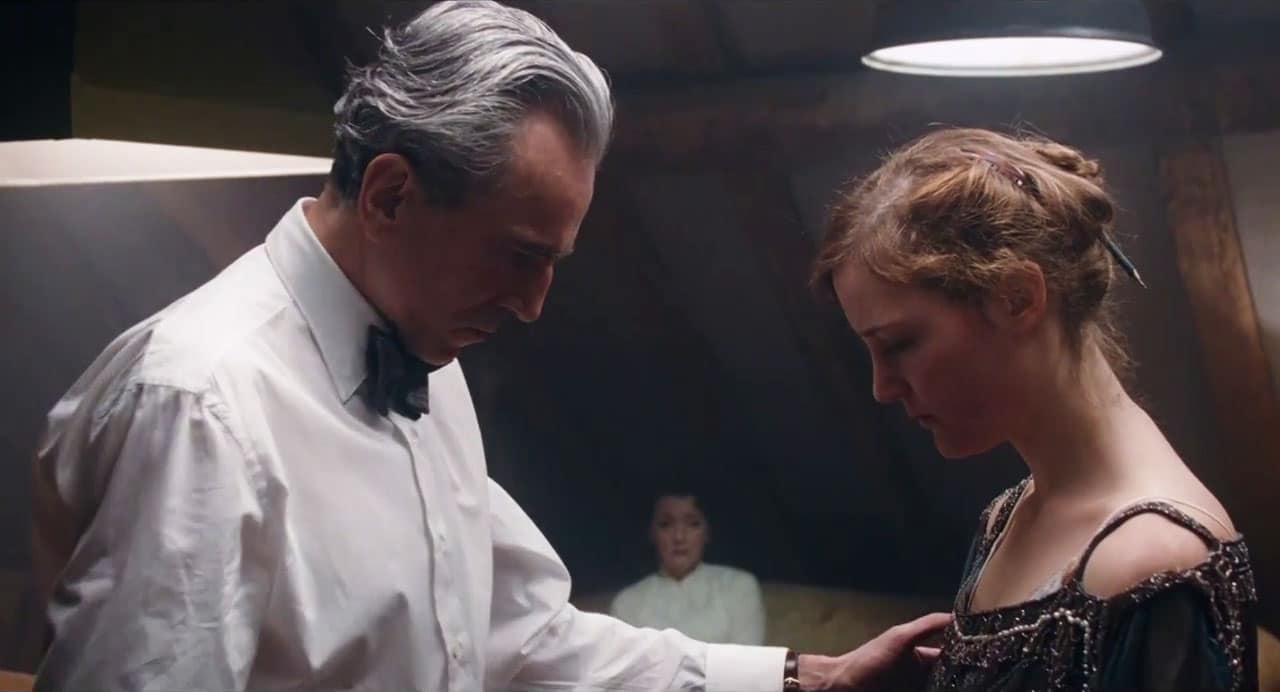Master Weaver, by Bob Connally
22 Jan
Through 21 years and 8 features, Paul Thomas Anderson has been making his mark time and again as a singular filmmaker. Often celebrated for his shot compositions and the level of bravura he brings to each project, what often gets lost is his extraordinary ability to create unique characters with incredible dimension. While his casting choices are impeccable there’s a reason the greatest actors of our time are so eager to work with him. For one actor in particular, Daniel Day-Lewis, Anderson’s latest film turns out to be (at least for now) an unexpected swansong. Few actors or actresses have had a better one.
In 1950s London, Reynolds Woodcock (Day-Lewis) is the most sought after dressmaker of the upper crust of not only British society, but of royalty throughout Europe. His attention to detail and the personal touches he brings to each and every garment are what earn him the admiration of the women who commission him. However his artistic temperament, as it were, has caused him to push away woman after woman in his relationships. Believing himself to be cursed in love (despite most, if not all, of his problems being of his own making), Reynolds has resigned himself to never marrying as though he knows it for a fact. Rather than do his own dirty work when it comes to ending things he leaves it to his sister Cyril (Lesley Manville) to make the necessary arrangements. Shortly after the conclusion of one relationship he begins another with a young waitress named Alma (Vicky Krieps). While Reynolds and Cyril ultimately expect things to play out as they normally do, Alma wants to ensure that they do not.
Phantom Thread is decidedly a Paul Thomas Anderson film in every respect. Every frame is worthy of being hung as a picture on your wall and exceptional actors are given the opportunity to play characters with tremendous depth who get to exchange glorious, often oddly funny dialogue. Most movies seem to be built upon the foundation of a story which characters are plugged into. What Anderson has done here is create characters and seemingly let the story grow out of them and their words and actions. It gives Phantom Thread a unique feel that won’t appeal to the masses but for Anderson’s admirers and probably most cinephiles in general, it contributes to a wonderful experience.
Apparently shot by Anderson himself (there is no official cinematographer credit given to anyone), the world of Phantom Thread is a hauntingly and somewhat mournfully beautiful one, befitting the characters who inhabit it. In Anderson’s previous collaboration with Day-Lewis, 2007’s There Will Be Blood, Day-Lewis’ Daniel Plainview was an overpowering figure, dominating every room he walked into. His Reynolds Woodcock is a man who wants to believe he dominates every room and often does, but unlike Plainview, Woodcock can be challenged. As his closest, practically inseparable, confidant, his sister Cyril has no fear of him and can even get the better of him in a dispute. Day-Lewis and Manville play off of each other in a way that really makes us believe they have been a brother and sister close through their whole lives. They convey it by doing very little on the surface which is a testament to their excellent chemistry.
As Alma, Krieps is able to more than hold her own with Day-Lewis as they snipe and argue to often surprisingly funny effect. Alma is more than just a counterpoint to Reynolds though and feels as fully realized a character as he is.
For all of the well-deserved praise Anderson has received through the years as a director, his screenwriting prowess tends to be overlooked in spite of a few Oscar nominations for it. With Phantom Thread he reminds viewers who may have forgotten that he is as complete of a filmmaker as there is working today. While his dialogue may not have the snappy hipness of Quentin Tarantino’s it is no less a pleasure to listen to, especially when delivered by some of the highest caliber acting talents in the world.
As stated above, Phantom Thread, like most of Anderson’s previous work, is not going to have mainstream appeal. It’s far too odd for that. This is a movie for people who truly love movies and who get absorbed by filmmaking and acting being performed at a very high level in service of telling a unique story about characters we haven’t quite seen before. This may be the end for Day-Lewis but, as ever, I am excited for what is to come from Paul Thomas Anderson.




No comments yet